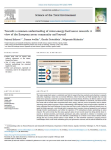Eriksson N., Avellán T., Teutschbein C., Blicharska M. (2025). Towards a common understanding of water-energy-food nexus research: a view of the European nexus community and beyond. Science of the Total Environment, 01/03/2025, vol. 967, p. 178775.
https://doi.org/10.1016/j.scitotenv.2025.178775
https://doi.org/10.1016/j.scitotenv.2025.178775
| Titre : | Towards a common understanding of water-energy-food nexus research: a view of the European nexus community and beyond (2025) |
| Auteurs : | N. Eriksson ; T. Avellán ; C. Teutschbein ; M. Blicharska |
| Type de document : | Article |
| Dans : | Science of the Total Environment (vol. 967, March 2025) |
| Article en page(s) : | p. 178775 |
| Langues : | Anglais |
| Langues du résumé : | Anglais |
| Catégories : |
Catégories principales 07 - ENVIRONNEMENT ; 7.4 - Ressources Naturelles : Paysage, Biodiversité, Patrimoine naturelThésaurus IAMM RESSOURCE EN EAU ; RESSOURCE ENERGETIQUE ; RESSOURCE ALIMENTAIRE ; RECHERCHE ; INTERDISCIPLINARITE ; RECHERCHE INTERDISCIPLINAIRE ; EUROPE |
| Résumé : | The water-energy-food nexus is a relatively new field of research that has received much attention in research and policy. Applying a nexus lens can increase efficiency, reduce trade-offs, and build synergies that can help tackle future pressures caused by increasing demands and climate threats. However, the field is subject to many perspectives and interpretations. The nexus concept lacks a common definition or framework, and some scholars have made calls to include other components than water, energy, and food, such as ecosystems, land or climate. Advancing nexus research requires a clearer understanding of the definition, aims and approaches of the field. To better understand the broad landscape of nexus views and chart a path of where the community intends to go, we apply the Delphi approach, a tool through which consensus about concepts, views and perspectives can be gained through iterative questionnaires, and utilise the expertise of 70 international scholars specializing in nexus research. The survey reveals that the nexus approach seems to have moved away from being strictly about resources or sectoral securities, and towards governance and policy, especially in relation to ecosystems and ecosystem services. However, this is not reflected in methodology or in where to focus future research efforts. Though the aim of nexus research seems to have shifted, it is still somewhat cemented in mapping resource interlinkages, which could hinder addressing policy and governance concerns, and the ethical dimensions of the nexus. Based on the results of the Delphi survey, we provide recommendations for future research that could progress the field further. |
| Cote : | En ligne |
| URL / DOI : | https://doi.org/10.1016/j.scitotenv.2025.178775 |







